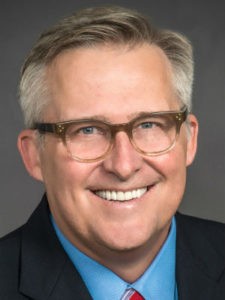
George Mason

Garrett Vickrey
Mark Twain put it pithily: “It were not best that we should all think alike; it is difference of opinion that makes horse races.” The novel coronavirus is not, however, a horse race. Opinions may differ, but we should not be indifferent to the consequences that flow from them.
Ethicist David Gushee’s opinion piece this week set off a firestorm on social media. He argued that it may be time for churches to reopen, despite the potential dangers of the spread of COVID-19. The reaction was at turns personal and principled. Little of it was nuanced. Some criticized Baptist New Global for publishing a piece that seemed contrary to the ideology of its constituency. But a truly Baptist news service provides a public forum to make a case that may dissent from popular opinion, and then also allows responses like this one.
Churches across the country are having serious conversations about when and how to reopen their facilities. They are wrestling with decisions that can’t always be neatly categorized as good or evil. They feel pressure from within and without.
“Churches are wrestling with decisions that can’t always be neatly categorized as good or evil.”
The pandemic has been politicized by state and federal officials and has trickled down to the pews in partisan ways. Church leaders feel those tensions in everything we do these days. When and how to reopen is no exception, despite this exceptional circumstance.
A few churches near Garrett’s home in San Antonio have reopened, only to close again when a staff member tested positive for COVID-19. One prominent church in George’s hometown of Dallas welcomed the vice president and other high-ranking government officials two Sundays ago. The service featured a 100-voice, unmasked choir and a crowded sanctuary with no apparent attempt at social distancing. We’ll see within two weeks how that works out.
The debate among progressive Baptists tends to pit science against the economy. We have seen the harm done by faith that ridicules reason and disregards science. We don’t want to be like that. We value human life above financial gain, putting people ahead of profits. But it isn’t always as simple as that.
Church giving thrives in good economic times and when members are personally engaged in congregational life. Many churches find themselves on the brink now, unable to pay their bills when online church is all they have to offer. Some churches, like ours, are unburdened by debt and are affluent enough to hold out longer than others. How long, though? And in the meantime, laying off staff or cutting wages to save the church during these times leaves families — often essential workers we say we care so much about — vulnerable in areas of health care, housing and hunger.
“We believe the response to the pandemic is an opportunity for us to honor local church autonomy and not to shame churches into opening or staying closed.”
We believe the response to the pandemic is an opportunity for us to honor local church autonomy and not to shame churches into opening or staying closed. We belong to a diverse body of churches. There are small congregations who meet in large buildings with excellent ventilation. There are churches in areas with little or no coronavirus presence. There are family size churches of 20 people from three families. These churches are basically a closed social bubble that can gather together safely and support each other through this pandemic.
There are also large churches in small buildings in cities where 20% of tests for COVID-19 are positive. There are congregations whose members’ average age is 82. There are churches who do not have the budget, supplies or volunteers to safely reopen their facilities. There are churches whose staff includes immunocompromised persons more vulnerable to COVID-19 complications.
Gushee points to the Catholic worship he has experienced that informs his optimism about reopening. George has recently attended a memorial Mass at a Catholic church and witnessed just such preparation. But the liturgical expectations of Catholics and Baptists are vastly different.
At the risk of oversimplifying, all churches are constituted by word and sacrament. Some, like Catholic churches, are oriented more toward sacrament than word. Protestants churches are oriented more toward word than sacrament. Baptists are closer to our Protestant cousins than our more distant Catholic relations. Catholic Mass will continue to satisfy those for whom intimacy with God is profoundly found in the eucharist. Individual worshippers can be ushered to and from the Table in relative safety. But Baptist worship is a festival of community.
Baptists believe the body of Christ is a gathered community. Our experience with God is rooted in our experience with one another. Whenever we survey our congregations, the answer comes back that what people miss most is “fellowship and community.” Masked worship services, without congregational singing or passing the peace or the ability to fill the narthex with laughter afterward, will not meet this need.
Each congregation must discern the way forward with the best tools available. Prudence is wise, as it weighs all factors against the church’s deepest values. It is likely that when any church regathers, there still will be some measure of risk to accept, even after a vaccine is widely available.
But prudence doesn’t give in to a general anxiety about the future or a fear of missing out when schools and businesses — or even other churches — open before we do. Re-opening because we are afraid of what might happen if we don’t is not a spiritually reasoned or theologically faithful decision.
“We believe the church should be a thermostat for the culture, not a thermometer.”
We believe the church should be a thermostat for the culture, not a thermometer. Christian churches should shape the conversation, bringing their values to bear on the communities around them in pursuit of the common good. We don’t need Great Clips to tell us when to reopen. We can’t cede moral leadership to Chick-fil-A in a time of pandemic (or any other time, for that matter).
We all long to be together again and celebrate the incarnational nature of our life together, which is an antidote to loneliness and a balm for our souls. Our faith is personal but never private; it is social and communal at the core. But that is also why we have to be so mindful of the command to love our neighbor as ourselves. We believe our bias now should be toward restraint out of love for one another.
Scripture admonishes us “not to neglect meeting together” (Hebrews 10:24-25). Yet, the apostle counsels married couples not to deprive one another of intimacy, except for an agreeable time that can be devoted to prayer until coming together again, lest they be tempted by a lack of self-control (1 Corinthians 7:5). This is a time of mutual prayer for the church until we can come together again. Our spiritual life is being tested. We must resist the temptation to return too soon.
We believe Christ calls us to sacrificial service on behalf of a world God loves. Not gathering for worship is a sacrifice. Maybe that’s the sacrifice some churches are called to make at this time for the sake of the greater good.
Nevertheless, there isn’t a one-size-fits-all response. Some churches may safely regather in full before others do. Some are thinking creatively about safe alternative opportunities for spiritual growth, such as opening their sanctuaries for people to come pray during the week or setting up outdoor chapels for small groups to meet outside or conducting drive-in worship services in their parking lots.
Let love be your guide, we are told in a thousand ways from Scripture, tradition and experience. That includes even disagreements among friends and colleagues over where love leads us in this challenging time.
Related stories:
Five reasons it’s time to talk about reopening our churches
While some try to politicize wearing face masks, for me it’s a spiritual practice
I have a few choice words for people protesting public health directives
Lessons from Disney to help churches reopen successfully
Q&A with Walter Brueggemann: Faith in a time of COVID-19
The First Amendment and religious freedom compel me to refute Trump’s position on churches reopening
